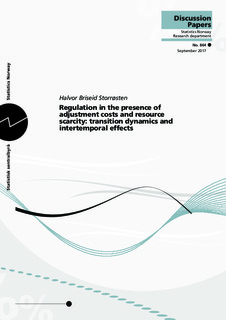| dc.contributor.author | Storrøsten, Halvor Briseid | |
| dc.date.accessioned | 2018-01-11T13:16:12Z | |
| dc.date.available | 2018-01-11T13:16:12Z | |
| dc.date.issued | 2017-09-20 | |
| dc.identifier.issn | 1892-753X | |
| dc.identifier.uri | http://hdl.handle.net/11250/2477023 | |
| dc.description.abstract | Announcement of future environmental regulation is likely to reduce current emissions in the combined presence of resource scarcity and adjustment costs.
This contrasts with the results in the literature on the green paradox. Further, efficient transition towards a low emission economy requires an investment tax on emission intensive production, unless firms have perfect information about the future. Moreover, investments in clean substitutes should first receive a subsidy, but may thereafter be taxed. The optimal tax on production differs from the Pigouvian tax in the case of scarce resources. Last, a uniform tax across heterogeneous agents can induce the socially optimal outcome only if firms have equal expectations about the future. | nb_NO |
| dc.language.iso | eng | nb_NO |
| dc.publisher | Statistics Norway, Research department | nb_NO |
| dc.relation.ispartofseries | Discussion Papers;No. 864 | |
| dc.subject | Klimaendring | nb_NO |
| dc.subject | Investeringer | nb_NO |
| dc.subject | Skatter og avgifter | nb_NO |
| dc.title | Regulation in the presence of adjustment costs and resource scarcity: transition dynamics and intertemporal effects | nb_NO |
| dc.type | Working paper | nb_NO |
| dc.subject.nsi | VDP::Samfunnsvitenskap: 200::Økonomi: 210::Samfunnsøkonomi: 212 | nb_NO |
| dc.source.pagenumber | 45 s. | nb_NO |
